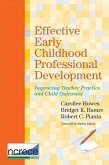The Head Start Debates
Herausgeber: Zigler, Edward; Knitzer, The Late Jane; Griffin, James; Bruer, John; Styfco, Sally
The Head Start Debates
Herausgeber: Zigler, Edward; Knitzer, The Late Jane; Griffin, James; Bruer, John; Styfco, Sally
- Broschiertes Buch
- Merkliste
- Auf die Merkliste
- Bewerten Bewerten
- Teilen
- Produkt teilen
- Produkterinnerung
- Produkterinnerung
This comprehensive, forward-thinking book will help you understand the complexity of Head Start, clarify the multiple sides of the debates that have long surrounded it, and shape effective social policy for America's most at-risk children and their families.
Andere Kunden interessierten sich auch für
![Effective Early Childhood Professional Development Effective Early Childhood Professional Development]() Effective Early Childhood Professional Development37,99 €
Effective Early Childhood Professional Development37,99 €![Learning from Head Start Learning from Head Start]() Learning from Head Start57,99 €
Learning from Head Start57,99 €![The Economics of Investing in Universal Preschool Education in California The Economics of Investing in Universal Preschool Education in California]() Lynn A KarolyThe Economics of Investing in Universal Preschool Education in California29,99 €
Lynn A KarolyThe Economics of Investing in Universal Preschool Education in California29,99 €![School Readiness and the Transition to Kindergarten in the Era of Accountability School Readiness and the Transition to Kindergarten in the Era of Accountability]() School Readiness and the Transition to Kindergarten in the Era of Accountability41,99 €
School Readiness and the Transition to Kindergarten in the Era of Accountability41,99 €![The Promise of Pre-K The Promise of Pre-K]() The Promise of Pre-K36,99 €
The Promise of Pre-K36,99 €![The Sage Encyclopedia of Contemporary Early Childhood Education The Sage Encyclopedia of Contemporary Early Childhood Education]() The Sage Encyclopedia of Contemporary Early Childhood Education625,99 €
The Sage Encyclopedia of Contemporary Early Childhood Education625,99 €![Foundations for Teaching Excellence Foundations for Teaching Excellence]() Foundations for Teaching Excellence37,99 €
Foundations for Teaching Excellence37,99 €-
-
-
This comprehensive, forward-thinking book will help you understand the complexity of Head Start, clarify the multiple sides of the debates that have long surrounded it, and shape effective social policy for America's most at-risk children and their families.
Hinweis: Dieser Artikel kann nur an eine deutsche Lieferadresse ausgeliefert werden.
Hinweis: Dieser Artikel kann nur an eine deutsche Lieferadresse ausgeliefert werden.
Produktdetails
- Produktdetails
- Verlag: Brookes Publishing Company
- Seitenzahl: 564
- Erscheinungstermin: 14. April 2004
- Englisch
- Abmessung: 253mm x 178mm x 31mm
- Gewicht: 1043g
- ISBN-13: 9781557667540
- ISBN-10: 1557667543
- Artikelnr.: 22113410
- Herstellerkennzeichnung
- Libri GmbH
- Europaallee 1
- 36244 Bad Hersfeld
- gpsr@libri.de
- Verlag: Brookes Publishing Company
- Seitenzahl: 564
- Erscheinungstermin: 14. April 2004
- Englisch
- Abmessung: 253mm x 178mm x 31mm
- Gewicht: 1043g
- ISBN-13: 9781557667540
- ISBN-10: 1557667543
- Artikelnr.: 22113410
- Herstellerkennzeichnung
- Libri GmbH
- Europaallee 1
- 36244 Bad Hersfeld
- gpsr@libri.de
> Sally J. Styfco is Research Associate at the Child Study Center and in the Psychology Department at Yale University and Associate Director of the Head Start Section at the Yale Center in Child Development and Social Policy. She is a writer and policy analyst specializing in issues pertaining to children and families, particularly early childhood and later educational intervention. Her work spans the topics of Head Start, child care, children with disabilities, federal education initiatives, the effects of poverty on child development, and the historical progression of government policies in these areas. Barbara T. Bowman is a pioneer in the field of early childhood education. Throughout her career, she has been an advocate for young children, applying knowledge about child development to her work integrating policy and practice. She is a founder and past president of Erikson Institute and has held local and national leadership positions in public education and professional organizations. She is currently on the faculty of Erikson Institute. Barbara T. Bowman is a pioneer in the field of early childhood education. Throughout her career, she has been an advocate for young children, applying knowledge about child development to her work integrating policy and practice. She is a founder and past president of Erikson Institute and has held local and national leadership positions in public education and professional organizations. She is currently on the faculty of Erikson Institute. John T. Bruer, Ph.D., has been a foundation executive for more than 20 years, administering programs in education, psychology, and neuroscience. He is the author of Schools for Thought (MIT Press, 1993) and The Myth of the First Three Years (Free Press, 1999). James A. Griffin, Ph.D., Deputy Chief, Child Development and Behavior Branch, Eunice Kennedy Shriver National Institute of Child Health and Human Development, National Institutes of Health, Director, Early Learning and School Readiness Program, 6100 Executive Boulevard, Suite 4B05, Rockville, MD 20852-7510. Dr. Griffin holds a Bachelor of Arts degree summa cum laude in psychology from the University of Cincinnati and a doctoral degree with honors in child clinical psychology from the University of Rochester. He completed a postdoctoral fellowship in psychiatric epidemiology at The Johns Hopkins University School of Public Health. Dr. Griffin's career has focused on research and evaluation efforts related to service systems and early intervention programs designed to enhance the development and school readiness of children from at-risk and disadvantaged backgrounds. The late Jane Knitzer, Ed.D. was Director of the National Center for Children in Poverty, and Clinical Professor of Population and Family Health in the Mailman School of Public Health at Columbia University in New York. In addition to her work with the National Center for Children in Poverty, Dr. Knitzer was also a Clinical Professor of Population and Family Health at the Mailman School of Public Health at Columbia University. As a psychologist, Dr. Knitzer focused her own research on improving public policies related to children's mental health, child welfare, and early childhood. Her work on mental health included the ground-breaking policy report, Unclaimed Children: The Failure of Public Responsibility to Children and Adolescents in Need of Mental Health Services (Children's Defense Fund, 1982). Most recently, she was a leader in calling attention to the importance of addressing social and emotional issues in young children. Dr. Knitzer was on the faculty at Cornell University, New York University, and Bank Street College of Education. She was a member of the New York State Permanent Judicial Commission on Justice for Children and a past president of Division 37: Child, Youth, and Family Services of the American Psychological Association, and a member of the American Association of Orthopsychiatry. She was the first recipient of the Nicolas Hobbs Award for Distinguished Service in the Cause of Child Advocacy from the American Psychological Association. Mariela M. Páez, Ed.D., is Associate Professor at the Lynch School of Education and Human Development, Boston College. She has a doctorate in human development and psychology from the Harvard Graduate School of Education. Her primary research interests include bilingualism, childrenâ (TM)s language and early literacy development, and early childhood education. Dr. Páez has conducted several longitudinal studies with young bilingual children with funding from the Eunice Kennedy Shriver National Institute of Child Health and Human Development (NICHD) and the Office for Educational Research and Improvement of the U.S. Department of Education. Currently, she is conducting a study investigating practices of exemplary teachers for dual language learners across different early childhood programs (i.e., public, private and Head Start). Dr. Páez is author of numerous articles in top journals and, with Marcelo Suárez-Orozco, co-edited Latinos: Remaking America (University of California Press, 2008). Craig Ramey, Ph.D., is the creator and founding director of the Abecedarian Project and its replicants including Project CARE and the Infant Health and Development Program. His program of research centers on the role of early experience, especially education â " across the human lifespan - in the development of competence and robust health. His approach relies largely on experimental interventions in education, psychology, and pediatrics that provide rigorous tests of plausible developmental mechanisms of stability and change within dynamic, multilevel ecologies. Arthur J. Reynolds, Ph.D., Professor, Institute of Child Development, University of Minnesota, Twin Cities, 51 East River Parkway, Minneapolis, Minnesota, 55455. Dr. Reynolds is Director of the Chicago Longitudinal Study, one of the largest and most extensive studies of the effects of early childhood intervention. He also studies the effects of early childhood intervention on children's development from school entry to early adulthood and the family and school's influences on children's educational success.








